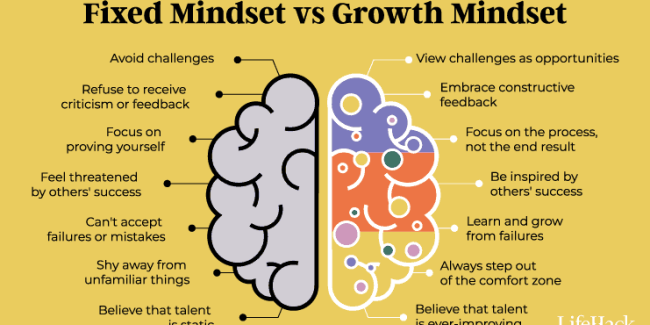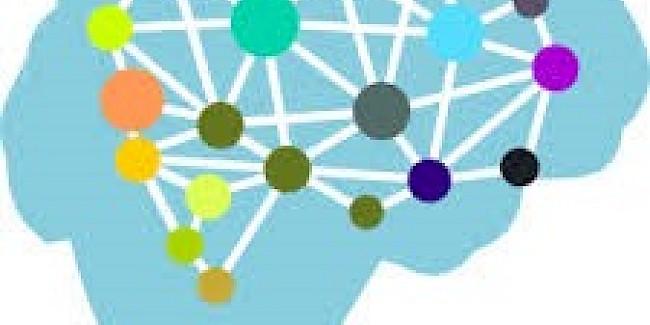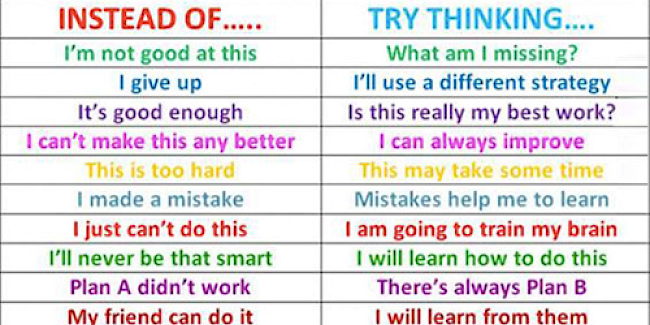Mindset is a simple idea discovered by world-renowned Stanford University
psychologist Carol Dweck in decades of research on achievement and success. Dr Dweck realised that there are two mindsets: a fixed mindset and a growth mindset. A person’s mindset can profoundly influence behaviour.
People with a fixed mindset believe that their innate abilities and intelligence are fixed traits. You can either do maths or you can’t. You can either make friends or you can’t. They also believe that talent alone creates success- without effort. With a fixed mindset, there is a reluctance to take on new challenges.

The term growth mindset was coined by American psychologist Professor Carol Dweck. Her work explored how an individual’s underlying belief about their intelligence and ability to learn could impact their performance.
Her studies show that those who believe they can develop their talents tend to achieve more than those who feel their abilities are innate and fixed. Those with a growth mindset see opportunities instead of obstacles, choosing to challenge themselves to learn more rather than sticking in their comfort zone.
As Professor Dweck explains it:
This growth mindset is based on the belief that your basic qualities are things you can cultivate through your efforts. Although people may differ in every which way—in their initial talents and aptitudes, interests, or temperaments—everyone can change and grow through application and experience.
People with a growth mindset believe that they can learn, change and develop needed skills through dedication and hard work. They are better equipped to handle setbacks and know that hard work and effort helps them learn and achieve results. A growth mindset supports children to focus on the process and progress they make rather than the final product. Dweck’s findings suggest that students will learn more, as well as learn faster and more thoroughly with a growth mindset.

The idea of a growth mindset is based on the scientific fact that when we practise and repeat an activity, we literally grow our brain by strengthening the neural pathways inside the brain. This means that as we learn and practise, links are made inside the brain which strengthen it and support us to remember new skills and knowledge. Our brain is like a muscle – when we exercise it by working through challenges, it gets stronger.
The words that we use can send powerful messages to ourselves and others:

Praising children for being ‘clever’ or for final achievements suggests that innate talent is the reason for success. Focusing on the process helps them see how their effort leads to success. Try using some of these phrases.
Person Praise | Process Praise |
| You are a natural in maths | These problems didn't give you much of a challenge. Let's move on to something that will really stretch your brain |
| You are so smart. | I like how you used different strategies to figure out these problems. |
| You are such a good boy. | I appreciate that you cleaned up the art classroom without being asked. |
| What a brilliant artist. | Your effort in learning to paint is apparent in you picture. |
| You are a born writer. | Your writing shows that you understand the value of word choice. |
Person Critique | Process Critique |
| You really messed this up | This didn't seem to work out for you. How could you approach this problem differently? |
| You did your best, but it is not good enough. | You didn't meet your goal, but what did you learn? |
| Maybe piano just isn't your thing | Keep practicing and you can get closer to mastering this. |
| You are such a naughty boy | You made a bad choice. What will you do differently if given a chance? |
Model learning from failure: When adults talk positively about making mistakes, children start to think of mistakes as a natural part of the learning process. Mistakes are OK and help us to learn!
Carol Dweck coined the phrase ‘the power of yet’ in her book about Mindset and it is a big part of instilling a growth mindset. Sometimes we all feel that we can’t do something. Putting the word yet at the end of a sentence starting with the word ‘can’t’ changes it into a much more positive phrase and implies that you will be able to do it in time. For example…
I can’t ride a bike …… yet.
I can’t bake a cake….. yet.
I can’t tap dance…. yet.
Teaching children how powerful this tiny word can be will go a long way to developing a growth mindset and more positive attitude to learning.
See this website for more information (and a fantastic Sesame Street Song!):
https://www.growkidsminds.com/blog/gkm011-the-power-of-yet
There is a wealth of information about Growth Mindset in the internet. Here are a few suggested links to follow if you are interested.
Three Ways Parents Can Instil a Growth Mindset
https://www.youtube.com/watch?v=ZrdKuDGQEoQ
Growth Mindset for Parents
https://www.youtube.com/watch?v=zH9cGGDAwxk
Building a Growth Mindset in Children
https://www.youtube.com/watch?v=BKisdb9tBYg